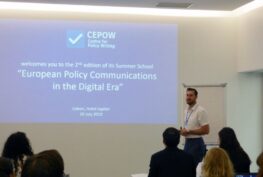Programme Description
Effective communication about and of public policy is difficult in today’s information environment. All actors in the policy process can recognise this challenge. If you work in governance, you know that without clear communication of your policy’s objectives and instruments, the citizens, the media, and other stakeholders may misinterpret it. This opens the door to both compliance gaps and disinformation, which impact the results of the policy itself. Ineffective policy communication can easily lead to sub-optimal policy outcomes.
For those aiming to have an impact in public affairs through advocacy or policy-relevant research, effective communication is also essential. You might be one of these policy entrepreneurs, dealing with policymaking audiences whose attention spans are fickle. To cut through the noise, your communication efforts need to get the right message across at the right time, and to be substantiated with convincing evidence. Otherwise, your research and advocacy will not be picked up by the policymakers.
Even though high-quality research and evidence are a good starting point for communication on policy issues, they are often not enough. Effective policy communication means persuasively combining evidence and data with stories, emotion, and values in a narrative frame that makes sense to the audience. The language used should also reflect this by being not only concise and understandable, but also stimulating and actionable. To get there, policy communicators need to avoid the so-called knowledge trap and step in their audience’s shoes.
This third edition of our Executive Certificate in Policy Communication – now with a session dedicated to Generative AI and Policy Writing – will equip you with skills needed to make sure your policy communication is clear, evidence-based, story-driven, and strategic – and not just an after-thought of policymaking or research. From topics such as audience analysis, crisis communication, and the role of narratives in policy communication to key outputs such as policy briefs, position papers, op-eds, and videos, this course asks critical questions about effective policy communication in the era of polarisation, disinformation, and radical uncertainty.
Find out more details about this course in policy communication developed by CEPOW Executive Director Jakov Bojovic: https://www.eui.eu/apply?id=executive-certificate-in-policy-communication-2025




